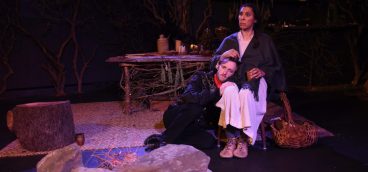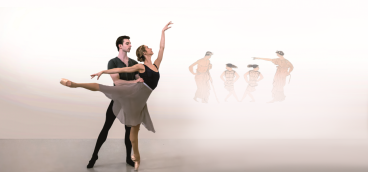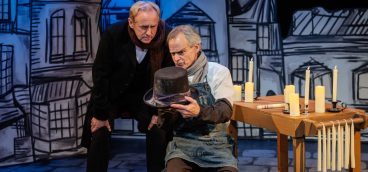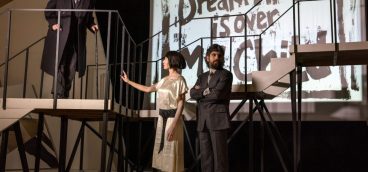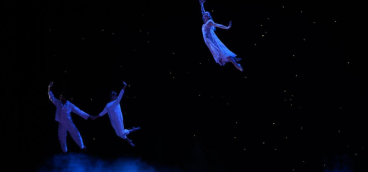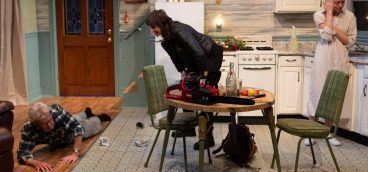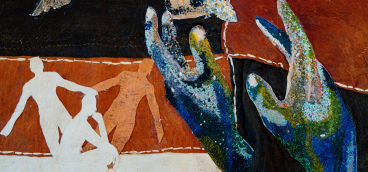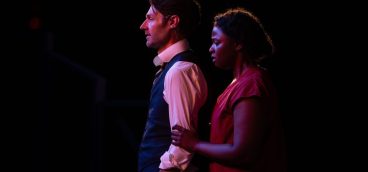Total War Over Cocktails
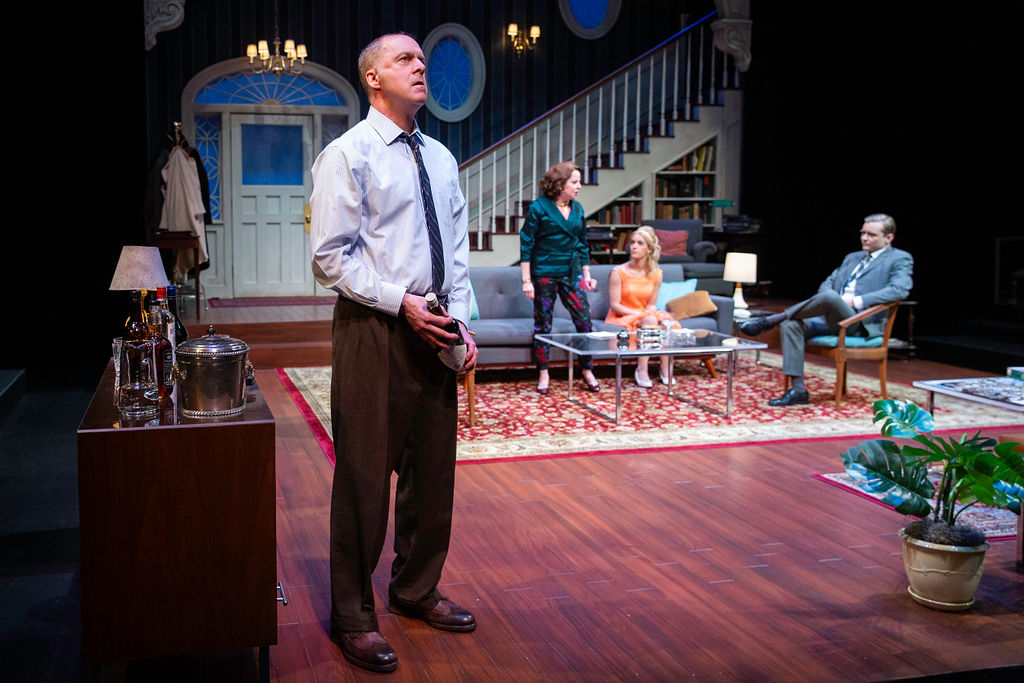
If there’s a miracle in Pittsburgh Public Theater’s current performance of the 1962 Edward Albee play “Who’s Afraid of Virginia Woolf?” — it’s that two well-educated couples can argue drunkenly for over three hours and never once broach the subject of politics. (And these couples are of different generations, no less). Of course, this would never happen today. But my oh my, how much more interesting conversation can be when the political realm is eschewed. And isn’t it amazing, as a result, how much more we listen to each other?
This is a big play in many ways, not just for its themes of marital strife, existential dread, and sexual meandering, but for its sheer verbosity. At about 40,000 words, it tops such classic, verbally intensive productions such as “Long Day’s Journey into Night” (35,000 words), “A Streetcar Named Desire” (30,000 words), and “Death of a Salesman” (20,000 words). But under Pamela Berlin’s direction, you would never notice this, as the delivery and pacing flow like the images seen through the window of a luxuriously smooth train. There are indeed two intermissions between its three acts – normally a red flag in contemporary theater – but in this case the breaks come just when you want them, making the experience of each act organically balanced. And here’s a pro-tip, PPT even allows you to pre-order drinks for the next intermission, so you can stay as lubricated as the characters if you truly want a communal experience, as this may be one of the most bibulous plays ever written.
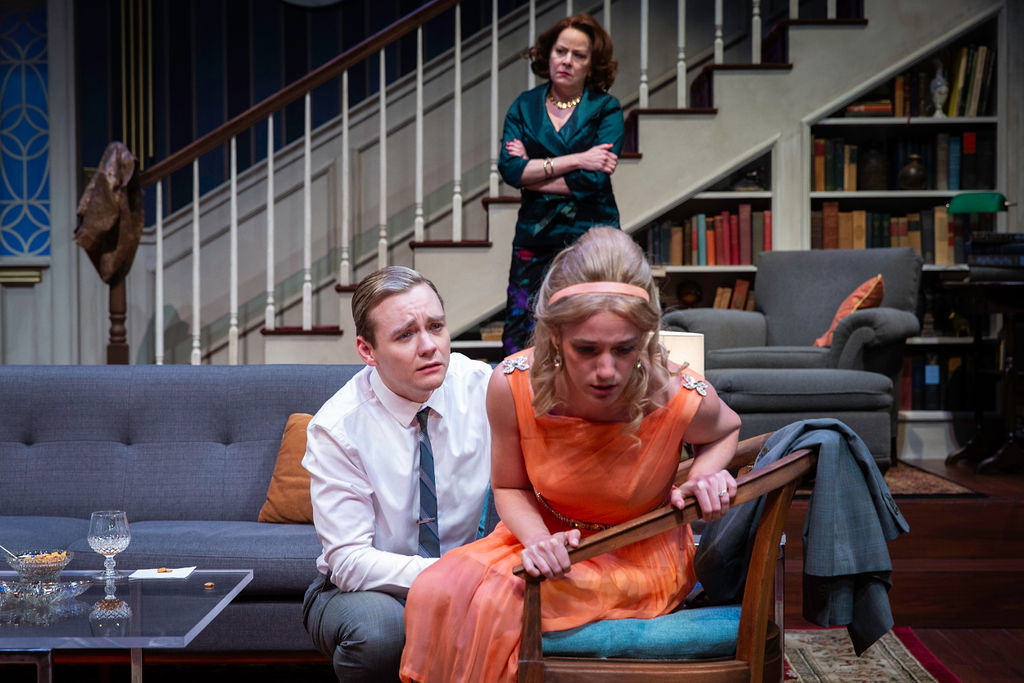
The plot couldn’t be simpler – an older couple invites a younger couple over for drinks after a faculty party at a small New England college – and we, as the audience, feel like we’re just across the room, eavesdropping on the conversation. George (Daniel Jenkins) and Martha (Tasha Lawrence) are the hosts, both middle-aged, and in a marriage that has burned through the last embers of its luminescence decades ago. These actors display a remarkable familiarity in their passive-aggressive patterns of speech: the way they talk over each other as well as finish each other’s sentences is masterful, and their lines run with the kind of natural, antiphonal cadence that you will rarely hear performed, even in meticulously edited films. In case you’re familiar with the cinematic version of this work, Mr. Jenkins is not imbued with the natural bombast of Richard Burton who played this role; rather, he lets his character’s repressed rage emerge over time as you can see him struggle to rise to whatever semblance of esteem he can muster through inebriation and the denial of his self-loathing. He’s an adagio soul living in a fortissimo world.
In the role of Martha, Ms. Lawrence projects the self-assurance of lion tamer bored with her job; she’s spent so many years whipping George that her verbal lashings are more a consequence of muscle memory than sadistic pleasure. She drinks and taunts, drinks and taunts, like an addict chasing a high she knows she’ll never reach again. Her voice is guttural, often bestial, and at its most melodic – according to George — is a form of braying. I think if she arm-wrestled Elizabeth Taylor (from the film version) she would take her two out of three.
Enter Nick (Dylan Marquis Meyers) and Honey (Claire Sabatine), the unsuspecting guests, some two-decades younger than George and Martha, who arrive, already a little tipsy, around 2:00 a.m. Honey is blond, petite, and wearing a carnival glass-colored dress, which is a pregnant choice by costume designer Suzanne Chesney, intimating how fragile Honey is, and indeed, she will break over the course of the debauched evening.
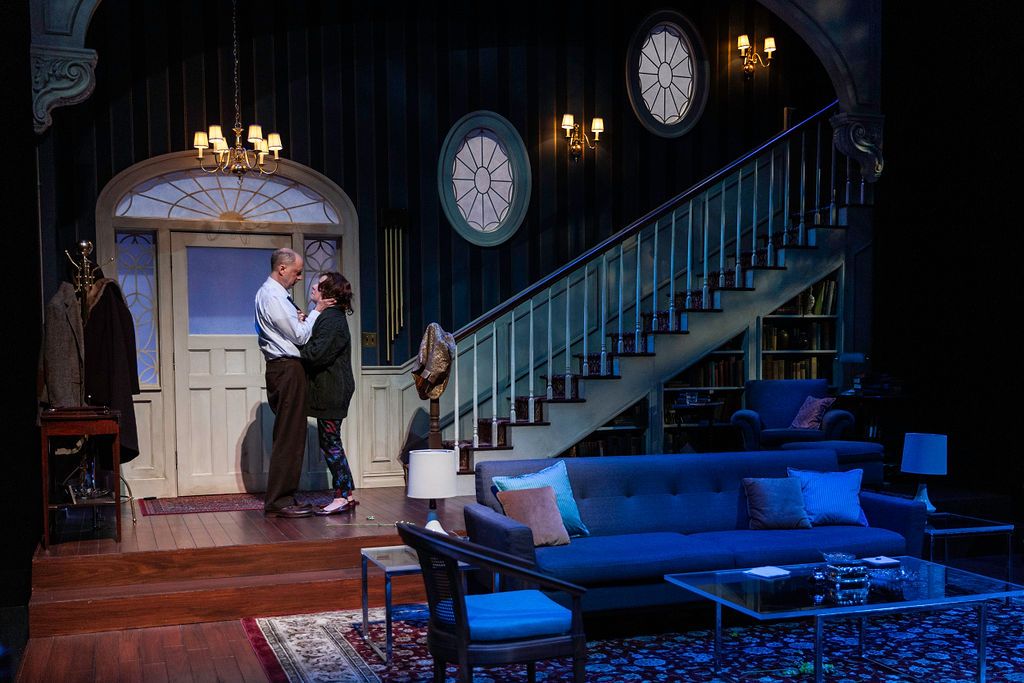
What ensues is a series of verbal games between George and Martha and their guests, which George has named and enumerates for everyone: first, “Humiliate the Host,” then “Hump the Hostess,” and finally, the most devastating psychologically, “Get the Guests.” We are certainly not in the polite world of “charades” or any other quaint parlor game. What Nick and Honey slowly realize is that they are engaging in something much more nefarious with their hosts. It’s as if they’ve gone to a zoo and somehow ended up inside the cages with the animals. This conceit is amplified by the prominent vertical stripes on the back wall of the living room, broken only by the small, porthole windows positioned like viewing portals into the world of these beasts.
As the evening progresses and the liquor is poured – George makes so many trips to the bar downstage one wonders why it isn’t just moved next to the sofa – the language, especially Martha’s, becomes more biting, and commensurately, the ripostes, increasingly merciless. One thing you’ll notice if you’re only familiar with the film version is how funny the dialogue plays in a live setting. And laughter is always an accelerant for derision.
Honey is the only one who doesn’t participate in George and Martha’s games. She’s too pure to be debased or to debase others. Plus, she can’t hold her liquor, so is offstage much of the time — reportedly lying on the cool floor of the bathroom – as all the booze and bile is too much for her. Nick tries to engage in the games, but ironically fails miserably, because you already have to have failed in life to be any good at playing.
A poignant moment occurs when Martha needles George to a point beyond his tolerance, and he smashes a liquor bottle against the bar. Shards go flying and with it any semblance of propriety for the evening. This “breaking of the vessels” might be construed as the breaking of their marriage, but it’s more of a signal that the games have just begun. Martha’s response is, “I hope that was an empty bottle, George. You don’t want to waste liquor . . . not on your salary.” And shortly after this, when George and Martha are finally alone on stage, they have this revealing exchange:
MARTHA. (Fake-spits at him.) You’re going to get it, baby.
GEORGE. Be careful, Martha … I’ll rip you to pieces.
MARTHA. You aren’t man enough … you haven’t got the guts.
GEORGE. Total war?
MARTHA. Total. (Silence. They both seem relieved … elated).
The role of Honey, like the role of Ophelia in “Hamlet,” can be challenging, because the character is vital to the action, but has so little stage-time that every moment must count in establishing her persona against the tempting path of cliché. Ms. Sabatine navigates this adroitly and makes a virtue out of the portrayal of Honey’s insouciance – like Ophelia she’s too human to understand the inhumanity in which these monsters are engaging.
Mr. Marquis Meyers – who is styled to look like the actor Helmut Griem in the film, “Cabaret,” – plays Nick as someone who isn’t a monster yet, but likes being close to these animals who so intrigue him. His frank exchange with George in Act II, reminiscent of the malignant bonding scene between the two brothers in “Long Day’s Journey into Night,” is an emotional pas de deux that ends with an aikido moment – a spiritual body slam that tells him, and us, there will be no redemption at the conclusion of this night.
Mr. Jenkins’ George rises convincingly from the ashes of his wife’s excoriations. We can see the molting of his pathetic nature in the third act – perhaps it’s the sea of booze he’s imbibed, or maybe we’re witnessing his actual transfiguration. But he’s no longer the whipped old lion. Without giving too much away, I’ll just say that the final scene is a synergistic tour de force of acerbic writing, actors taking risks, and inspired direction. It’s the kind of theater that scares you and exults you at the same time.
In designing the expansive set – which appears more appropriate to the scale of a gladiator ring than the living room of small-college assistant professor — Jason Simms seems to abide by Thoreau’s observation in Walden regarding “the difficulty of getting to a sufficient distance from my guest when we began to utter the big thoughts in big words.” So often in contemporary theater the sets are fashioned in a compressed way, as if to ramp up the intensity by lessening the space between characters, but in this case, the expansion allows the intensity to be more fully – and dramatically — expressed.
In the end we are immersed in a kind of obscene intimacy with these souls who have traveled so far beyond the normal boundaries of civility that it seems they will never be able to return, which perhaps is the most relevant point of comparison to today. In an age when civility is at the center or our societal acrimony, we can learn a lot from sitting in George and Martha’s living room and just listening. Besides, after 40,000 words and three-and-a-half hours, what else could possibly be said to bring them, and us, together?
WHO’S AFRAID OF VIRGINIA WOOLF? continues through April 6th at the O’Reilly Theater, Downtown. $35-93. www.ppt.org or 412-316-1600.


